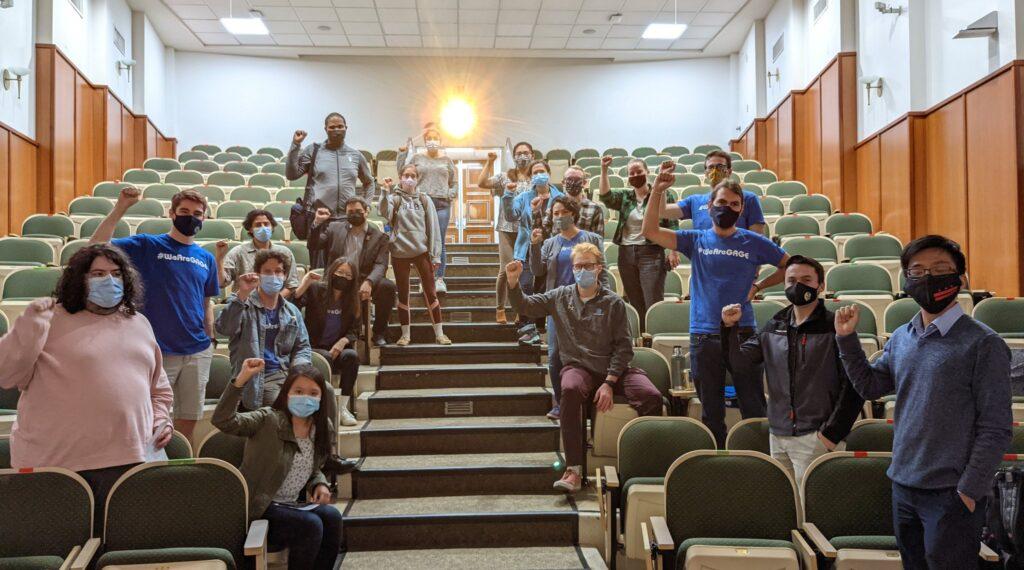The Georgetown Alliance of Graduate Employees (GAGE) launched a survey of its members to gather feedback about priorities for the union’s second contract, which they can begin negotiating with the administration this fall.
GAGE negotiated its first contract with the university in May 2020, which established better policies for teaching remotely and will expire in June 2023. The 2021-22 bargaining survey includes questions for GAGE members about their income and living expenses, resources available to them in the workplace, health benefits, safety and inclusivity, diversity of graduate student workers, and personal priorities.
The survey is one of the first ways in which GAGE hopes to obtain members’ opinions and desires when negotiating a new contract, according to Dominick Cooper (GRD ’24), vice president of GAGE.

“Our bargaining survey is the first step towards achieving a contract that best addresses the needs and priorities of our diverse membership,” Cooper wrote in an email to The Hoya. “Our upcoming contract campaign, like our first one, is above all a collective and democratic effort driven by many GAGE members. This effort begins by gaining an understanding of what all of us care about, and how we want to see our work lives within the Georgetown community continue to improve.”
The survey will provide the GAGE bargaining committee with data on its members’ priorities for the upcoming contract, according to Jewel Tomasula (GRD ’22), chair of the GAGE bargaining research committee.
“Our bargaining survey includes an issues ranking section that will help GAGE members form consensus on our priorities for our second contract,” Tomasula wrote in an email to The Hoya. “From our organizing conversations, one thing we already know is that grad workers are experiencing financial stress from the inflation surge and costly emergencies brought on by the pandemic. We’ve also learned that we need to make explicit in our contract our right to have a voice in health, safety, and other matters that impact grad workers.”
The university, GAGE and the American Federation of Teachers (AFT) will collaborate during negotiations, according to a university spokesperson.
“We are looking forward to working together with GAGE-AFT on this process,” the university spokesperson wrote in an email to The Hoya.
While the negotiation process cannot begin until fall 2022, the bargaining survey is an essential step in ensuring its members’ objectives are represented, according to Cooper.
“The survey is a way for GAGE members to connect with one another and talk about how our work lives are collectively going and how they can be improved,” Cooper wrote. “This takes lots of organizing amongst GAGE members, and the conversations we have with one another now will form the bedrock of our contract campaign during the 22-23 academic year.”
Graduate student workers must ensure that their new contract maintains the same protections amid the changes in learning and teaching during the COVID-19 pandemic, according to Cooper.
“The COVID-19 Pandemic, unsurprisingly, has changed a lot of the ways in which we think about safety and well-being in the workplace, as well the ways in which our current stipends, employment policies (especially those of hourly workers and international grad workers), and health care plans are still falling short in some ways to meet the needs of our membership,” Cooper wrote.
In September 2020, GAGE entered into the arbitration process with the university, alleging that the university violated their contract by refusing to continue negotiating about Georgetown’s fall reopening policies. In January 2021, after the arbitrator ruled that the university failed to bargain in good faith with GAGE about policies related to the COVID-19 pandemic, the two parties were required to return to negotiations about issues including health services subscriptions and COVID-19 testing and vaccination. Ultimately, student workers were guaranteed equipment for remote teaching and face masks, among other COVID-19 protections and resources.
The COVID-19 related side agreements, the result of the negotiations following the arbitration process, allowed GAGE to advocate for and expand its protections under the contract, according to Cooper.
“The side agreement that GAGE members won during the pandemic last year helped to fix some of these problems, and we are learning from these lessons as we look to implement them permanently and on a bigger scale in our next contract,” Cooper wrote.
GAGE hopes to improve the graduate student worker experience at Georgetown by advocating for its second contract, according to Tomasula.
“Our first contract was a huge step forward in making graduate work at Georgetown more accessible and inclusive because we won significant pay raises, new benefits like dental insurance, and more equitable policies,” Tomasula wrote. “But the reality is that Georgetown still has room for improvement, and we’re excited for another opportunity to make conditions better for graduate student workers here.”




















